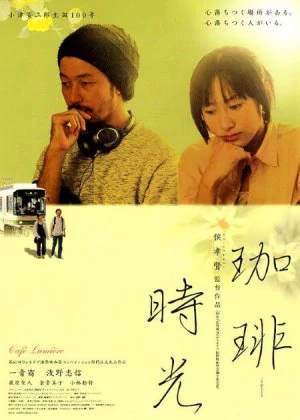Café Lumière
When I first heard of Hsiao-Hsien Hou's Café Lumière [Kohi Jiko], it was kind of a big thing. The idea of Hou and Tadanobu Asano collaborating on a film set in Japan was somewhat of a dream come true, needless to say expectations were high. When I finally got to see it I liked it a lot, but there was also a part of it I found rather hard to grasp. That was ages ago though and I was excited to revisit the film once more, if only to see if the film had retained its mysterious aura.
![screen capture of Café Lumière [Kohi Jiko]](/thumbs/style/site/1200xauto/cafe-lumiere-1.webp)
At least one thing that's changed since then is that I'm feeling a bit more ambivalent about Hou's oeuvre. While there's no doubt he made some excellent films throughout his careers, there is also a considerable amount that I feel isn't up to par. On top of that, his reputation has turned into somewhat of a hindrance for Taiwanese cinema (though that's a credit he shares with Edward Yang and Ming-liang Tsai). What started out as a positive boost quickly turned into a stifling force that began to hold back creativity. In the West, Taiwan equals the Taiwanese New Wave and directors with international aspirations had little choice but to stick to the format. Luckily the younger generations have moved on, though the West hasn't really caught on yet.
Café Lumière was commissioned as part of a big Yasujiro Ozu retrospective. To celebrate Ozu's 100th birthday, Hou was approached to make a film that would channel the vibe of the late director. It was a perfect match, considering how much the two directors overlapped, stylistically speaking. I'll readily admit that I'm not very knowledgeable when it comes to Ozu's work (I've seen a couple, enough to get the broader picture), but from other reviews it's pretty clear that what people refer to as Ozu references could just as well be references to Hou's earlier work.
There isn't that much actual plot here, instead Café Lumière is one of the purer pieces of slice of life cinema I've come across. The film follows Yoko as she returns to Japan to inform her parents of her pregnancy. Her parents are a little concerned when she tells them she plans to raise the kid by herself, but that's as dramatic as it gets. The remainder of the time is spent with Yoko and Hajime investigating a Taiwanese composer for the book she's writing. It's an extremely thin narrative, but that comes with the territory.
![screen capture of Café Lumière [Kohi Jiko]](/thumbs/style/site/1200xauto/cafe-lumiere-2.webp)
Visually the film is very much in line with other late 90s/early 00s Hou films, sporting rather long takes and an almost static, slow-moving camera observing the characters. A lot of this also translates to Ozu's style, but people who've seen Millennium Mambo and Three Times will surely recognize Hou's hand. The result is a composed and tranquil film, though fragile and delicate at the same time. It's not spectacular-looking, but it gives off a very pleasant visual vibe and the way Hou frames his shots is truly beautiful.
The soundtrack settles for being a decent addition to the visuals. There isn't that much music to begin with, the few bits of music there are, are almost exclusively piano pieces. More interesting are the slightly accentuated soundscapes, often revealing the things happening behind the camera. The street noises or garden cicadas expand the setting beyond what the camera can register, often creating two different sensory realities. One you can see and one you can hear.
If you need an actor with plenty of screen presence while doing nothing much at all, Tadanobu Asano is your man. He is absolutely perfect for the part and delivers, but that's hardly surprising. The same can be said about Yo Hitoto though, a noticeably more remarkable feat considering this was her first ever part in a movie. The secondary cast is small but solid, with a stand-out role for Nenji Kobayashi as Yoko's dad. He has hardly any dialogue, but his body language is telling.
![screen capture of Café Lumière [Kohi Jiko]](/thumbs/style/site/1200xauto/cafe-lumiere-3.webp)
The last time I watched Café Lumière I wasn't feeling too well. I drifted in and out of sleep and experienced the film as if in a trance. It's actually a suprisingly appropriate way to watch it, though luckily not the only way to enjoy the film. Mind though that if you don't like slow cinema or hate films that don't have a lot of narrative drama, this film isn't going to be for you. There is no obvious beginning or ending to the story, instead you just spend some time with two characters, going about their business.
Café Lumière held up pretty well, which isn't even that surprising knowing its appeal lies in the mundane. While the film started out as an ode to Ozu, it fits snugly into Hou's oeuvre and can just as easily be seen as Hou's little trip to Japan. Don't expect to be dazzled or overwhelmed, instead settle for a cosy, sweet and warm film and you might be surprised just how captivating Hou's signature touches can be. Café Lumière is an amazing film to revisit, even if its not all that easy to pinpoint what exactly makes it great. That's something you'll have to find out for yourself.
